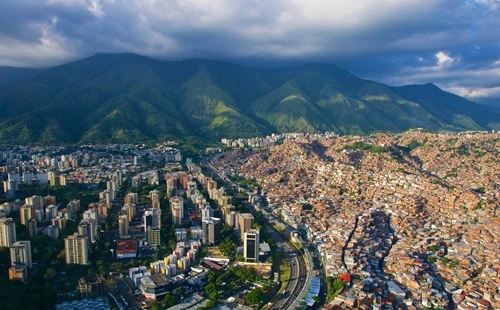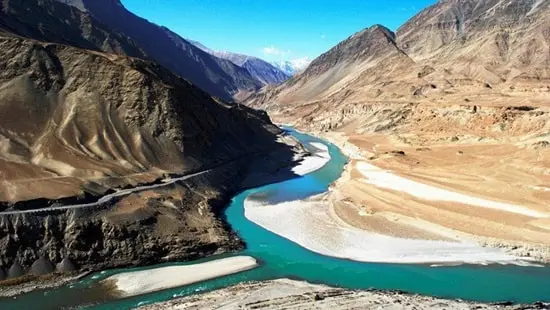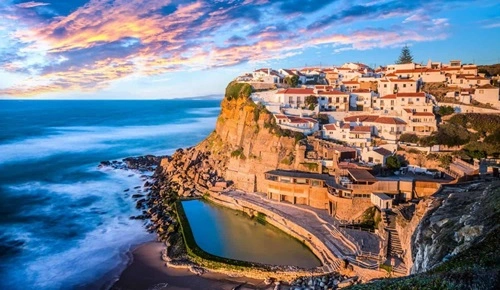Venezuela, known as the “Land of Grace,” is a South American country rich in natural beauty, cultural diversity, and unique historical heritage. From towering mountains and vast plains to vibrant cities and a resilient spirit, Venezuela is a place of contrasts and wonders. While it faces challenges today, the country is home to fascinating facts, resilient people, and incredible landscapes that capture the hearts of those who explore it. Here are over ten interesting facts about Venezuela that shine a light on its beauty, culture, and complexities.

1. Home to the World’s Highest Waterfall: Angel Falls
One of Venezuela’s most famous natural wonders is Angel Falls, or “Salto Ángel,” the highest uninterrupted waterfall in the world. Located in Canaima National Park in the Gran Sabana region, Angel Falls has a total height of 3,212 feet, with a main drop of over 2,600 feet. Named after American aviator Jimmie Angel, who brought global attention to the falls in 1933, this majestic site attracts adventure seekers, photographers, and nature lovers from around the world.
2. Venezuela Has One of the Largest Oil Reserves in the World
Venezuela sits atop one of the largest oil reserves globally, particularly in the Orinoco Belt, making oil the backbone of its economy. Oil production began in the early 20th century and transformed Venezuela into one of Latin America’s wealthiest nations in the 1970s. Although the country faces economic challenges today, oil continues to play a crucial role in its economy and political landscape, influencing everything from national policies to international relations.
3. Caracas: One of the World’s Most Diverse Cities
Venezuela’s capital, Caracas, is a vibrant city known for its diversity, bustling energy, and striking setting against the Avila mountain range. Caracas boasts a unique blend of modern skyscrapers, colonial architecture, and urban green spaces. The city is also known for its rich culture, featuring lively music scenes, art galleries, and a wealth of museums. Despite social and economic challenges, the people of Caracas maintain a strong sense of community and pride in their heritage.
4. Venezuela’s Beaches: Paradise on the Caribbean
Venezuela is blessed with over 1,700 miles of Caribbean coastline, featuring some of the most beautiful beaches in Latin America. The country’s coastal islands, including Margarita Island, Los Roques Archipelago, and Morrocoy, are popular destinations for travelers seeking pristine white sand beaches and turquoise waters. The marine life and coral reefs in Venezuela’s coastal regions make it a paradise for snorkeling, diving, and water sports enthusiasts.
5. The Lightning Capital of the World
Venezuela is home to a unique natural phenomenon known as “Catatumbo Lightning,” a recurring lightning storm that occurs near Lake Maracaibo almost 300 nights a year. Known as the “Lighthouse of Maracaibo,” this phenomenon can produce up to 280 lightning strikes per hour, lighting up the sky in a dramatic display. Scientists believe that the unique topography and atmospheric conditions around Lake Maracaibo contribute to this constant lightning activity, making it a fascinating spectacle for locals and scientists alike.
6. The Birthplace of Simón Bolívar, “El Libertador”
Venezuela is the birthplace of Simón Bolívar, known as “El Libertador,” who played a pivotal role in Latin America’s struggle for independence from Spanish colonial rule. Bolívar led military campaigns that liberated Venezuela, Colombia, Ecuador, Peru, and Bolivia, and his legacy is celebrated across the region. Statues, streets, and even an entire country, Bolivia, are named after him. Bolívar’s birthplace in Caracas is now a museum, where visitors can learn about his life and contributions to the independence of Latin America.
7. A Treasure Trove of Biodiversity
Venezuela is one of the most biodiverse countries in the world, hosting vast ecosystems that range from Amazonian rainforests and Andean mountains to coastal wetlands and savannas. The country is home to more than 25,000 species of plants and a wide variety of wildlife, including jaguars, pumas, capybaras, and giant anteaters. Venezuela’s commitment to conservation is evident in its many national parks, such as Canaima and Henri Pittier, which protect its rich flora and fauna and attract eco-tourists from around the globe.
8. Arepas: Venezuela’s Iconic Dish
Arepas, round corn cakes made with maize flour, are a staple food in Venezuela and one of the country’s most beloved culinary traditions. These versatile cakes can be filled with various ingredients, such as cheese, shredded beef, avocado, or black beans, and are enjoyed at any time of the day. Each region in Venezuela has its take on the arepa, making it a unifying dish that represents the country’s culinary diversity. Arepas have even gained popularity internationally, especially in cities with large Venezuelan communities.
9. The Music of Joropo
Joropo is Venezuela’s traditional music and dance, originating from the plains (llanos) and typically performed with the harp, maracas, and cuatro (a small guitar). This lively genre reflects the spirit of the Venezuelan plains, blending indigenous, African, and European influences. Joropo dances are often fast-paced and energetic, involving intricate footwork and close partner interactions. Nationally celebrated during festivals and cultural events, joropo embodies Venezuela’s cultural heritage and sense of national pride.
10. Venezuela’s Unique Currency: The Petro Cryptocurrency
In 2018, Venezuela became one of the first countries to launch its cryptocurrency, known as the Petro, which is backed by the country’s oil reserves. Created to combat hyperinflation and avoid international sanctions, the Petro represents an experimental approach to economic stability. While its effectiveness and adoption remain topics of debate, Venezuela’s initiative demonstrates its willingness to explore innovative financial solutions, even as the country navigates economic challenges.
11. The Vast Llanos: A Wildlife Paradise
The Llanos, Venezuela’s expansive plains, are one of the world’s largest tropical grasslands and home to an impressive array of wildlife. During the dry season, the plains dry up, leaving only scattered water sources that attract large concentrations of animals like capybaras, caimans, anacondas, and birds. The Llanos is a popular destination for ecotourism, with safaris that allow visitors to experience Venezuela’s stunning wildlife up close and gain insight into the region’s unique ecosystem.
12. Venezuela’s Black Gold: El Oro Negro
In addition to oil, Venezuela is also known for its reserves of a rare black rock known as El Oro Negro (black gold), or gabbro. This mineral-rich rock contains precious metals like gold and copper. The country’s diverse geological formations make it a significant player in natural resources beyond oil. Mining for black gold, however, raises both environmental and economic concerns, adding another layer to Venezuela’s complex relationship with natural resources.
13. The Maracaibo Basin: Largest Lake in South America
Lake Maracaibo, the largest lake in South America, is both a geological marvel and a vital source of resources for Venezuela. Located in the Maracaibo Basin, this massive lake is technically a bay due to its connection to the Caribbean Sea. It’s also one of the oldest lakes in the world, estimated to be around 20-40 million years old. The lake’s surrounding region is central to Venezuela’s oil industry, producing much of the country’s petroleum and natural gas.
14. A Land of Tallest and Longest
In addition to Angel Falls, Venezuela is home to some impressive land features, including the longest river in the country, the Orinoco River, which spans over 1,300 miles. The Orinoco Basin is one of the largest river systems in South America, stretching into Colombia and covering nearly a third of Venezuela’s territory. The river’s basin supports diverse ecosystems and local communities, making it an essential part of Venezuela’s geography and heritage.
Conclusion
Venezuela is a land of stunning beauty, rich cultural heritage, and remarkable natural phenomena. From the world’s tallest waterfall and the recurring lightning storms of Lake Maracaibo to its status as one of the world’s leading oil producers, Venezuela is a country filled with fascinating contrasts. Each of these facts provides insight into the country’s vibrant culture, complex history, and natural wonders. Whether exploring its cities, admiring its biodiversity, or learning about its history, Venezuela offers a unique experience that captivates the imagination and inspires admiration. Despite its challenges, the resilience and spirit of Venezuela and its people continue to shine, making it a place of undeniable intrigue and charm.



